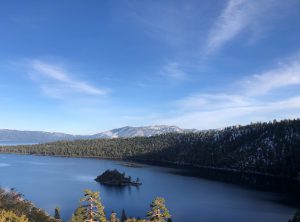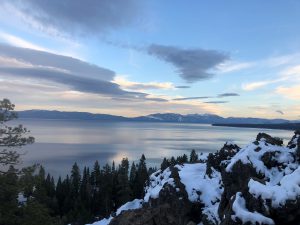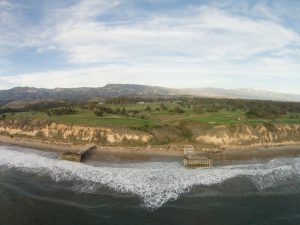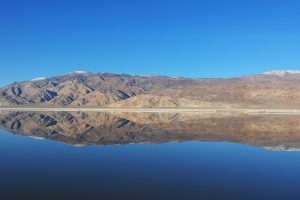Executive Officer’s Message

Jennifer Lucchesi, Executive Officer of the California State Lands Commission
On behalf of the Commission, I am excited to share our new 2021-2025 Strategic Plan. This aspirational and forward-looking document is a result of comprehensive and inclusive engagement with the Commission’s stakeholders, tribal partners, and the public. The 2021-2025 Strategic Plan addresses key issues including public access, climate change and sea-level rise, environmental justice, tribal relations, sustainable economic development, and environmental protection. This Strategic Plan builds on the Commission’s progress since the adoption of the previous Strategic Plan and identifies the emerging challenges and opportunities the Commission is committed to addressing over the next five years and beyond.
The Strategic Plan outlines seven focus areas:
These focus areas and accompanying goals will guide the Commission’s priorities and response to emerging issues over the next five years. These areas and goals are rooted in collaborative partnerships, proactive leadership, equitable and inclusive decision-making, and bold action. They guide our path forward to ensuring a more resilient, equitable, sustainable, and thriving California for all.
Thank you to everyone who provided input, ideas, and time to inform the development of this bold Plan. And thank you to everyone who visits this page to learn more about the Commission’s Strategic Plan. We hope you will continue to stay engaged with the Commission and to lend your voice to the work we do on behalf of all Californians.
Commission Updates

02/04/2020 – On February 4, 2020, the Commission held a special meeting to facilitate a public discussion and solicit input and engagement from various stakeholders to help inform the Commission’s 2021-2025 Strategic Plan. The Commission received insights and suggestions from Mark Gold, Ocean Protection Council Executive Director and California Natural Resource Agency Deputy Secretary, and various tribal governments. Through a panel discussion, the Commission engaged with various lessees, port representatives, environmental protection representatives, and environmental justice advocates. The robust panel discussions provided a wealth of information, perspectives, and priorities for the Commission’s consideration.
02/28/2020 – At its February 28, 2020, public meeting, the Executive Officer provided an informational update on the status of efforts to develop the Commission’s next strategic plan. In her presentation, the Executive Officer shared that the Commission was in the process of soliciting proposals for a consultant to assist staff in the public outreach and development of the new plan. There were also five public commenters who provided input and recommendations for the strategic plan. The comments and recommendations included reducing harmful air emissions at ports through the use of zero-emission technology; encouraging renewable energy, including offshore wind energy; coordinating with other agencies to map out the permitting process for renewable energy projects; promoting aquaculture; providing grant funding for public access; and providing increased public access to open space for environmental justice communities.

04/29/2020 – In April 2020, the Commission awarded the strategic plan consultant contract to Stantec Consulting Services, Inc. Stantec has tremendous experience in providing strategic planning services to State agencies, including the California Tahoe Conservancy’s 2023 strategic plan, the Delta Protection Commission’s Vision 2030 document, the California Water Plan, and the Off-Highway Recreational Motor Vehicle strategic plan. Commission staff began working with Stantec immediately to identify stakeholders and develop questions and resources for stakeholder interviews. The stakeholders included individuals and entities interested in or associated with climate change/sea-level rise, the blue economy, public access, California ports, renewable energy and utilities, the oil and gas industry, tribal governments, environmental justice, air quality and public health, land and wildlife conservation, public land and resource management and protection, and state and local agencies.
06/23/2020 – Stantec has been meeting with staff to gather contact information and develop discussion points with stakeholders. Stantec envisions conducting virtual interviews with individual stakeholders and small focus groups of stakeholders with common interests. The small group meetings allow stakeholders to build off each others’ comments. Stantec is in the process of scheduling and conducting these individual and small focus group stakeholder interviews and will soon begin interviews with the Commissioners and staff. The consultant anticipates providing a draft strategic plan for public comment later this summer. Stantec will continue to provide progress reports at each of the upcoming Commission meetings.

08/20/2020 – Stantec has interviewed 79 of the 149 identified stakeholders in virtual interviews included individual and small focus group sessions. Many of the stakeholders were unable to participate and others were not responsive. Several cited the COVID-19 pandemic workload as the reason for their inability to participate. During these interviews, Stantec facilitators asked stakeholders a series of questions to assess familiarity with the Commission’s work and current 2016-2020 strategic plan, gather insight into the structure and metrics for the next strategic plan, and identify important themes, trends, and new initiatives to inform the development of the 2021-2025 strategic plan. The Stantec team reviewed and organized the input across the various fields of interest to identify key topics and intersecting themes. Stakeholders frequently referred to public access, renewable energy, and climate change, and sea-level rise as important topics to address in the 2021-2025 strategic plan. Across these topics, Stantec identified key intersecting themes: Equity and Environmental Justice; A Post-Petroleum Economy; and the Evolving Nature of the Public Trust Doctrine in land and resources management. Stakeholders also emphasized the role of collaboration and the value of innovation in addressing climate change and sea-level rise. During the August 2020 Commission meeting, Stantec provided an informational presentation on the input collected during the stakeholder interview. The Commission is preparing a series of Tribal Government roundtable sessions and consultations. These Tribal sessions, combined with the comprehensive stakeholder input, future public, and internal comment will inform the development of the new five-year strategic plan. Staff and the Stantec team will continue to provide updates on the development of the 2021-2025 strategic plan to the Commission.
10/22/2020 – Staff briefed the Commission about its progress with developing a new five-year strategic plan and on recent regional roundtable sessions with our tribal partners. Several key and intersecting themes emerged from these roundtables for inclusion in the Commission’s next strategic plan. Staff also reported that the Commission’s consultant, Stantec, recently convened an in-depth workshop with the Commission’s senior staff, where thoughtful and comprehensive input was collected. The next strategic plan is intended to be an aspirational, forward-thinking document that reflects ample stakeholder input. During the staff presentation, the Commissioners emphasized the importance of including marginalized and disadvantaged communities’ perspectives and working with Native American tribes. Staff plans to continue its outreach and release a draft strategic plan by December 17, when the Commission has its next public meeting. This draft will launch the next phase in the development of a new strategic plan, which is to elicit continued meaningful feedback and fashion a final strategic plan to guide the Commission’s work for the next five years.

12/17/2020 – Staff briefed the Commission about its newly released draft 2021-2015 strategic plan, a visionary plan focusing on climate change, evolving public trust values, Tribal partnerships, collaboration, and environmental justice, among other things. The Commission’s consultant provided an overview of the structure, content, and process, and the Commission’s Executive Officer provided context about the next steps and the importance of stakeholder engagement. The Commission expressed its commitment to continuous engagement with stakeholders and staff, and to continuing a robust and open dialogue as it works to finalize its new strategic plan. February 1, 2021, is the deadline for public comment. Staff will prepare a revised draft strategic plan after incorporating comments on its initial draft strategic plan.
02/23/2021 – The Commission unanimously adopted its 2021-2025 Strategic Plan. The Plan addresses key issues including public access, climate change and sea-level rise, environmental justice, tribal relations, sustainable economic development, and environmental protection. The Commission developed this Plan through comprehensive and inclusive engagement and outreach efforts. During this process, the Commission held a special meeting that facilitated a comprehensive discussion of the Commission challenges and opportunities to be addressed in the Strategic Plan, provided updates at each Commission meeting with opportunities for public comment, worked with a consultant to interview stakeholders across varied interests, and facilitated a series of tribal engagement sessions and government-to-government Consultations.

